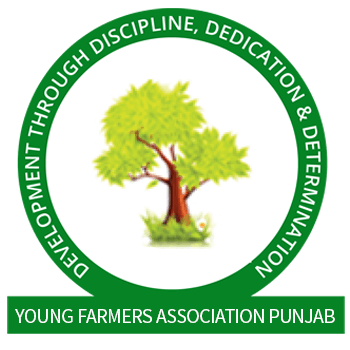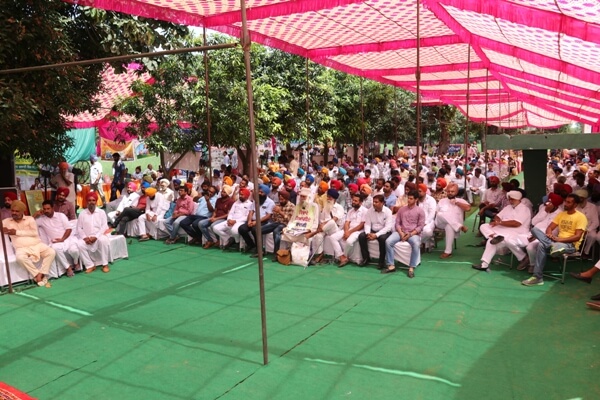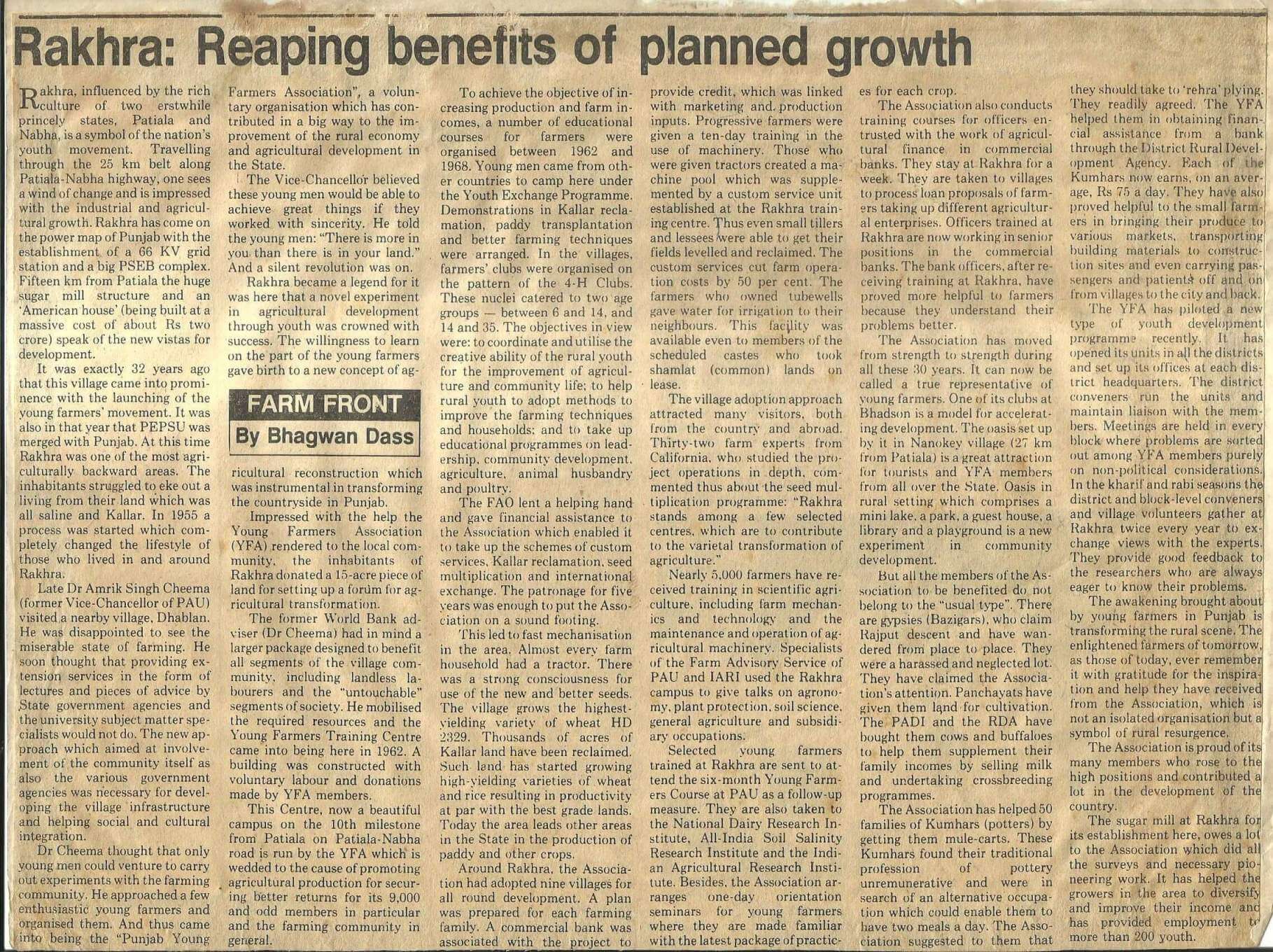Rakhra, situated on the Dr. Amrik Singh Cheema Marg, is a well-known village wherefrom benefits of modern technology and new seeds reach the farmers of the north region through the Young Farmers Association, Punjab.Half a century ago in the 1960s this village came into prominence with the launching of the young farmers’ movement. At this time Rakhra was one of the most agriculturally backward areas. The inhabitants struggled hard to eke out a living from their land which was saline and ‘kallar’.
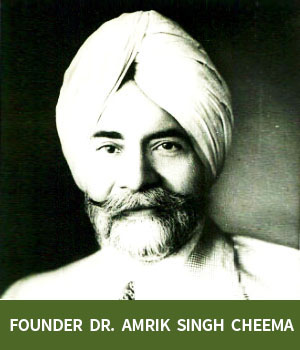
Late Dr. Amrik Singh Cheema, the then Director of Agriculture Punjab and Former Vice-Chancellor of Punjab Agricultural University, visited the area in 1960. He was disappointed to see the poverty of the farming community. He talked to a few farmers and concluded that providing extension services in the form of lectures and advice by the state government agencies was not sufficient. He believed that a multifaceted approach was necessary to solve the problems of the farmers and their families. Therefore, he ensured the involvement of farmers and various government agencies to work together in developing the village infrastructure and helping social and cultural integration.He approached a few enthusiastic young farmers and organized them. And thus came into being the “Young Farmers Association, Punjab (YFA)”. This process brought positive change in the lives of those living there and around Rakhra.
Dr. Cheema told young men: “There is more in you than there is in your land.” Rakhra became a legend as the novel experiment in agricultural development through youth power began here which later became a model of development. The willingness to learn on the part of the young farmers gave birth to a new concept of agricultural reconstruction which later transformed the countryside.
To achieve the objective of increasing production and farm income, a number of educational courses for farmers were organized at Rakhra Campus. The FAO came forward to strengthen the training programme. Young men from other countries under the youth exchange programme participated in the education progammes recognized by YFA. Demonstrations in ‘kallar’ reclamation, for use of new machines and better farming techniques were arranged. In villages farmers’ clubs were organized on the pattern of 4-H Clubs.
YFA took a lead in introducing the “village adoption approach”. Towards the close of sixties, the association adopted nine villages for all-round development and organized training courses for officers entrusted with the work of agricultural finance in commercial banks. The officers stayed in the villages for a week which changed their outlook and build their confidence to work with a “new type of clientele.”These officers later worked in senior positions in the agricultural finance departments of various banks.
Rice is now a principal kharif crop of the state of Punjab. YFA trained farmers serve as catalysts for adoption of new technology and seeds. Pusa Basmati-1637, Pusa 44 and Pusa Basmati 1121 & PB-1401 (Pusa Basmati -6), PB-1509 and Pusa Basmati 1728 & 1718 varieties have been introduced in the state by YFA. These varieties occupy a large area and have resulted in much better economic returns to the growers.
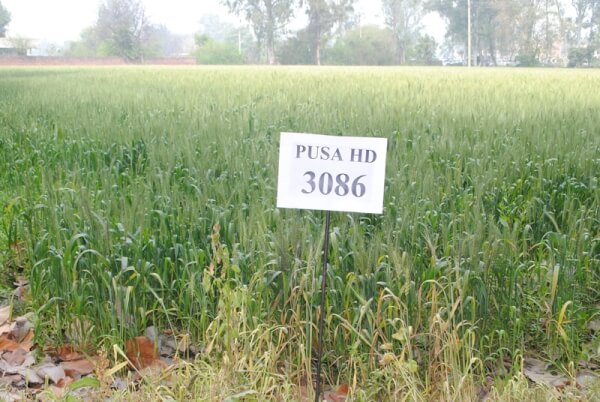
HD-3086 variety of Wheat released in the association is cultivated on the largest area in the North –West India.
HD 2329, the highest yielding wheat variety which at one time occupied more than 85 percent area under cultivation of wheat in the state was also brought by the association in the beginning of the eighties. Its breeder late Dr V.S. Mathur conducted experiments at the association’s farm for years. PR 106 variety of rice also reached the growers from the Rakhra campus in 1976. Now, when the PBW 343 wheat variety grown in the state for the last decade and a half had fallen a prey to yellow rust resulting in the decline of yield the association arranged for the HD 2967 and HD-3086 wheats which were a high- yielder and disease-free varieties. It resulted in augmenting the productivity which last year touched 51 Quintals.
YFA has approximately 9,000 and old members who benefit from it. They are invited twice a year at the Kisan Melas organized by the association. YFA equips the farmers with new research done outside the state particularly at IARI & ICAR.
The members of the association who have benefited include gypsies (bazigars). Banjar shamlat lands were got leased out/allotted to them now grow lush green crops and provide good living in certain villages. Over 50 families of “Kumhars” (potters) were earning their living as a result of help rendered by YFA.
The association has suggested varietal diversification in rice by adopting and enlarging area under basmati cultivation to save water and provide diversification. YFA has a tie up with the Indian Agricultural Research Institute. The association’s farm demonstrates the new varieties developed by IARI and provides foundation seeds of the successful varieties to farmers. IARI’s scientists regularly visit the Rakhra Campus for monitoring the programmes. The ICAR has set up IARI –Collaborative Outstation Research Centre at YFA’s Rakhra Campus to conduct the research and develop varieties & technologies suited to Punjab. Farming communities of the state are likely to draw immense benefit from this initiative of the ICAR through IARI & YFA.
